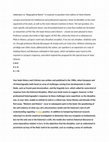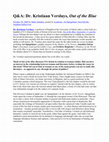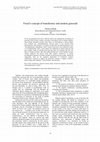Papers by Dominick LaCapra

Varia Historia, 2024
LaCapra summarizes his intellectual and professional trajectory, those he identifies as the main ... more LaCapra summarizes his intellectual and professional trajectory, those he identifies as the main arguments of his work, as well as the most relevant reactions to them. The last question, of a more specific and authorial nature, was formulated based on a text that marked our formation as researchers at PUC-Rio: the book History and Criticism-a book we were pleased to learn Professor LaCapra also holds in high regard. At PUC-Rio, where the three of us obtained our PhDs in History, LaCapra's work had a Brazilian reception, if we are not mistaken, relatively early on, through professors Ricardo Benzaquen de Araújo and Luiz Costa Lima. Without claiming any privilege over other issues addressed by the author, our question is an expression of a way of relating history and literature cultivated in that space, which we believe owes much to this moment in LaCapra's trajectory, and which inspired the proposal for this special issue of Varia Historia.
This biographical exchange was prepared for a group of scholars at Tsinghua University who are wo... more This biographical exchange was prepared for a group of scholars at Tsinghua University who are working on translations of a number of my books into Chinese. Crucial to its genesis and conception were exchanges with André Martins and his colleagues at the journal "Varia Historia" where a version of it is planned for publication in 2024. Note that in this entry, there is an error. On p. 8, "Charles Turner" should be "Charles Taylor."

American Imago, 2020
This review by Lewis Kirshner is is a concise, insightful analysis of the important book "Trauma:... more This review by Lewis Kirshner is is a concise, insightful analysis of the important book "Trauma: The New Critical Idiom" by Lucy Bond and Stef Craps. I agree with Kirshner about its value and usefulness as a critical account of the nature and role of trauma in recent cultural studies, including its reference to my own work in the field. I would, however, introduce a few qualifications in the discussion of my use of the concepts of historical and structural trauma. I have often pointed out that there is a distinction but not a simple dichotomy or binary opposition between the two. They are typically compounded or intertwined in empirical instances of trauma. Moreover, it may be the case that a historical trauma may be so extreme that it may be taken as paradigmatic and given structural significance, for example, with respect to the Holocaust or slavery. And the role of structural trauma may be especially marked in certain traditions, notably, the Western tradition where the fall or the death of God has been a crucial reference point.
Globalization and Critisal Animal Studies, 2023
This essay on “Globalization and Critical Animal Studies” is to be published by Brill in a collec... more This essay on “Globalization and Critical Animal Studies” is to be published by Brill in a collective volume on globalization entitled ReFiguring Global Challenges: Literary and Cinematic Explorations of War, Inequality and Migration edited by Johan Högland, Amanda Minervini et al. It has as a coda a recent interview that Amanda Minervini did with me concerning the relation between the Academy and the larger society.
MLN, 1982
Permit me to inscribe your name at the head of this book, and above its dedication : for it is to... more Permit me to inscribe your name at the head of this book, and above its dedication : for it is to you, before all, that I owe its publication. By becoming part of your magnificent de fe nce, my work has acquired for myself, as it were, an unex pected authority. Accept, then, here, the homage of my grat itude, which, however great, will never attain to the level of your eloquence and your devotion.
History and Theory, 2011
A version of this essay may be found in my book History, Literature, Critical Theory (Cornell Un... more A version of this essay may be found in my book History, Literature, Critical Theory (Cornell University Press, 2013). The book also includes an introductory overview and chapters, similar in structure, on Conrad and Flaubert, Coetzee and Sebald, and history and literature. It also has studies of Zizek and violence and of the general issue of the literary, the historical, and the sacred with respect to Nazism. The majority of the chapters are not published elsewhere.
Rethinking History, 2022
Taynna Marino offers an informative and thought-provoking discussion of the concept of empathy in... more Taynna Marino offers an informative and thought-provoking discussion of the concept of empathy in the context of both the conceptual relations between the work of Ailton Krenek and myself and the larger problem of building bridges between indigenous and "Western" forms of thought and practice.

Academia, 2009
Dr. Kristiaan Versluys, a professor of English at the University of Ghent, takes a close look at ... more Dr. Kristiaan Versluys, a professor of English at the University of Ghent, takes a close look at a handful of 9/11-themed works of fiction in his new book, Out of the Blue: September 11 and the Novel. Perhaps the best thing I can say about it is that it prompted me to rethink my reactions to the novels he discusses-I may never be a great admirer of Don DeLillo's Falling Man, but the book reveals how carefully DeLillo worked to mimic the ways that traumatic events unsettle our ability to tell stories. Dr. Versluys does much the same for the other books he covers indepth, including Art Spiegelman's graphic memoir In the Shadow of No Towers, Jonathan Safran Foer's Extremely Loud and Incredibly Close, and Frédéric Beigbeder's Windows on the World. Out of the Blue is an academic book, but it's low on jargon, and provides some useful context for the debates about 9/11 fiction that are bound to emerge in the future. Dr. Versluys answered questions about Out of the Blue via e-mail. -- Mark Anthitakis
Peer Reviewed Articles 7 , 1990
“Vom Nutzen und Nachteil der Literatur für die Geshichtswissenschaft: A Historian’s view” is a we... more “Vom Nutzen und Nachteil der Literatur für die Geshichtswissenschaft: A Historian’s view” is a well-informed and insightful discussion of the relations between literature and history, focusing on the uses and abuses of literature in historiography.
Kansas Journal of Sociology, 1974
I recently came across this review published in 1974. It provides a noteworthy critical analysis ... more I recently came across this review published in 1974. It provides a noteworthy critical analysis of my first book on Durkheim, which has frequently been misunderstood and often seen through inappropriate lenses. It indicates ways in which this early work, despite its limitations, was not entirely traditional and separated from modes of inquiry in my later work that tried to engage certain of Derrida's emphases (among those of others such as Freud and Bakhtin). It is thus a useful supplement to Edward Baring's excellent article/chapter included earlier on this site.

Revista de Psihologie Aplicata, 2009
So far, psychoanalysis has had a relatively minor role regarding the psychology of genocide. Only... more So far, psychoanalysis has had a relatively minor role regarding the psychology of genocide. Only recently, scholars, researchers and analysts such as Jacques Semelin, Slavoj Žižek, Dominick LaCapra, Dan Stone, J.S. Kerstenberg, or Steven Baum, have initiated new conceptualizations derived-more or less directly-from psychoanalysis. Their purpose is to deepen and diversify our understanding of social "decontamination" phenomena, whose extreme forms have been regarded by many as incomprehensible. Such a goal requires the rethinking of modern genocide and mass murder, firstly by moving them from the space of exception, into the very fabric of modern societies' ethos and cultural frameworks. To the Freudian concepts already employed, the present study adds negative transference as present psychological experience of hostile emotions of unconscious past origin. Among the suggestions, there are the analytical implications of (collective) negative transference's capacity to channel the destructive energies it triggers, towards a fantasy figure that "embodies" the individuals' idiosyncrasies.
Resisting Apocalypse and Rethinking History in "Manifestos for History", 2007
"Resisting Apocalypse and Rethinking History" was published in "Manifestos for History" (2007) ed... more "Resisting Apocalypse and Rethinking History" was published in "Manifestos for History" (2007) edited by Keith Jenkins et al. and published by Routledge. The book as a whole, including my essay, is carefully and critically reviewed by John Toews below.
Historia de Historiografia, 2020
In a concise analytic manner, Baquero explores the problem of a "history of the present" involvin... more In a concise analytic manner, Baquero explores the problem of a "history of the present" involving events and processes close enough in time to implicate living memory and even the existence of witnesses and participants still alive in the present. I think the analysis could be extended to the more distant past insofar as it continues to raise pressing problems or live issues for the present and its inhabitants, including historians. One need not agree with all of Baquero's arguments or conclusions to recognize his essay's ability to stimulate critical thought about important matters of continuing concern.
History, Theory, Text: Historians and the Linguistic Turn, 2004
This is an excellent, well-informed review of the important book of Elizabeth A. Clark, "History,... more This is an excellent, well-informed review of the important book of Elizabeth A. Clark, "History, Theory, Text: Historians and the Linguistic Turn." It surveys the work of historians related to the so-called linguistic turn and indicates the relevance of their work for the study of her own specialty, Patristic literature.
Docupedia-Zeitgeshchichte, 2010
Riccardo Bavaj offers an informed, critical survey of the state of contemporary intellectual hist... more Riccardo Bavaj offers an informed, critical survey of the state of contemporary intellectual history. One critical point I would make about a footnote in Bavaj's paper is that not all statements in intellectual history may be judged according to the neopositivitic or scientistic binary: either falsifiable or ineffective/vague in some unspecified (vague?) way. Some admissible statements, especially with respect to complex and at times very difficult texts, may be interpretive, effective, and open to judgment in terms of whether or not they are insightful and/or thought-provoking. In another entry, I offer a critique of Jacoby's argument in the paper to which Bavaj refers. In that entry, the reader may find and come to his or her own conclusions about the pages to which Bavaj refers.
Deconstruction and LaCapra, 2016
This is the page initially missing from the next entry, Baring on Deconstruction and D. LaCapra
Companion to Intellectual History/Wiley-Blackwell, 2016
This is an essay on intellectual history and deconstruction among American historians focusing on... more This is an essay on intellectual history and deconstruction among American historians focusing on D. LaCapra with briefer discussions of J. Surkis, C. Robcis, and a few others. Baring is an exceptionally good reader of Derrida as well as of my own work.
Writing History, Writing Trauma, 2001
This is a chapter of WRITING HISTORY, WRITING TRAUMA on Holocaust testimonies.

History and Theory, 2014
This is an excellent essay. To quote the author's own abstract: it "reads Derrida's early work wi... more This is an excellent essay. To quote the author's own abstract: it "reads Derrida's early work within the context of the history of philosophy as an academic field in France. Derrida was charged with instruction in the history of philosophy at the École Normale Supérieure, and much of his own training focused on this aspect of philosophical study. The influence of French history of philosophy can be seen in Derrida's work before Of Grammatology, especially in his unpublished lectures for a 1964 course entitled "History and Truth," in which he analyzed the semantic richness of the word "history." According to Derrida, "history" comprised both the ideas of change and of transmission, which allowed the writing of history at a later time. In the Western tradition, Derrida suggested, philosophers had consistently tried to reduce the idea of history as transmission, casting it simply as empirical development in order to preserve the idea that truth could be timeless. Derrida's account of the evolving opposition between history and truth within the history of philosophy led him to suggest a "history of truth" that transcended and structured the opposition. I argue that Derrida's strategies in these early lectures are critical for understanding his later and more famous deconstruction of speech and writing. Moreover, the impact of this early confrontation with the problem of history and truth helps explain the ambivalent response by historians to Derrida's analyses."
Reclaiming Identity, ed. L. Alcoff & M. Hames-Garcia, 2000
Whatever the extent to which one agrees or disagrees with its argument, I think this is a well in... more Whatever the extent to which one agrees or disagrees with its argument, I think this is a well informed and well argued paper by John Zammito. So is the essay by John Toews as well as the essay by Joan Scott which Zammito discusses. I would still maintain that Toews's important paper does not provide a sufficiently developed analysis of the concept of experience. I make an attempt to offer a critical analysis of the concept and some comments about the other papers in "Experience and Identity," the initial chapter of the book HISTORY IN TRANSIT (2004).

Uploads
Papers by Dominick LaCapra
Presidential Session of 2014 including presentations on the work of Dominick LaCapra.
Referring to the Presidential Sessions for 2014, Jan Goldstein, the President of the AHA that year, wrote on November 5: “The session on poststructuralism doubles as a session in honor of Dominick LaCapra, one of the historians most influential in introducing that current of thought into the American academy; it features LaCapra as commentator.” The presentations were from Martin Jay, Judith Surkis, Gabrielle Spiegel, and myself. The session was organized and introduced by Carolyn Dean. A version of the presentation of Gabrielle Spiegel may be found on this site as well as elsewhere on the web.
Presidential Session of 2014 including presentations on the work of Dominick LaCapra
Referring to the Presidential Sessions for 2014, Jan Goldstein, the President of the AHA that year, wrote on November 5: “The session on poststructuralism doubles as a session in honor of Dominick LaCapra, one of the historians most influential in introducing that current of thought into the American academy; it features LaCapra as commentator.” What follows is the presentation of the contributions of Martin Jay, Judith Surkis, and myself. The session was organized and introduced by Carolyn Dean. A version of the presentation of Gabrielle Spiegel may be found on this site as well as elsewhere on the web.